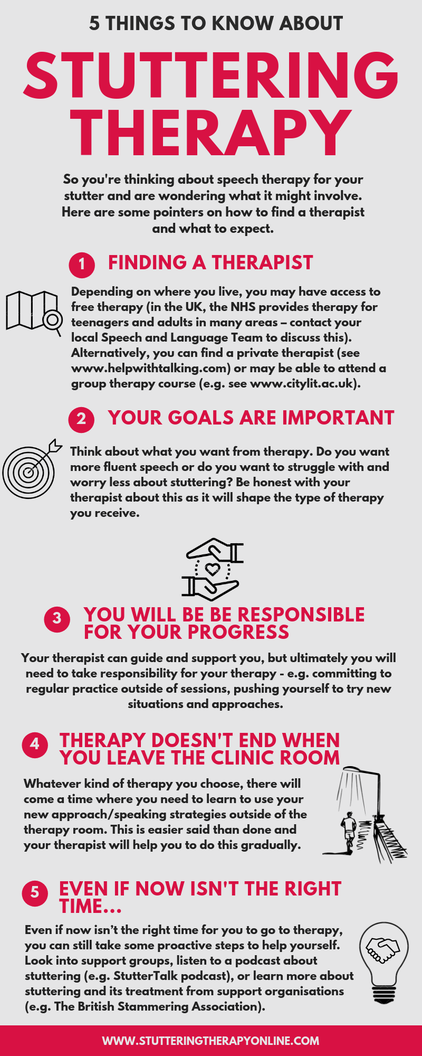Thinking About Stuttering Therapy? Here Are Our Top 5 Tips

So you're thinking about speech therapy for your stutter and are wondering what it might involve.
Here are 5 things to know about finding a therapist and what to expect.
Feel free to download and share.
Text version of above information sheet:
- Finding a therapist: Depending on where you live, you may have access to free therapy (in the UK, the NHS provides therapy for teenagers and adults in many areas – contact your local Speech and Language Team to discuss this). Alternatively, you can find a private therapist (see the ASLTIP website, www.helpwithtalking.com) or may be able to attend a group therapy course (e.g. see City Lit's stammering courses, www.citylit.ac.uk).
- Your goals are important: Think about what you want from therapy. Do you want more fluent speech or do you want to struggle with and worry less about stuttering? Be honest with your therapist about this as it will shape the type of therapy you receive.
- You will be responsible for your progress: Your therapist can guide and support you, but ultimately you will need to take responsibility for your therapy - e.g. committing to regular practice outside of sessions, pushing yourself to try new situations and approaches.
- Therapy doesn't end when you leave the clinic room: Whatever kind of therapy you choose, there will come a time where you need to learn to use your new approach/speaking strategies outside of the therapy room. This is easier said than done and your therapist will help you to do this gradually.
- Even if now isn't the right time...: Even if now isn’t the right time for you to go to therapy, you can still take some proactive steps to help yourself. Look into support groups near you, listen to a podcast about stuttering (e.g. StutterTalk podcast), or learn more about stuttering and its treatment from support organisations (e.g. www.stamma.org).
Tired of Stuttering?
We can help. Learn more about our proven therapy and how we guarantee you will be happier with how you speak - or your money back.
More Free Guides
What Treatments Are Available For Stuttering? + Which Are The Most Effective? (Teenagers & Adults)
Find Free Fluency Techniques Here
|
Stuttering Therapy Online provides both free resources and one-to-one online therapy for stuttering. We care about helping you find the right support.
Paid Online Therapy
Modifying Phonation Intervals 2 Programme (MPI-2) |




